第36章 CHAPTER VII THE POND(3)
The dragon of the subterranean treasures treats me generously. He gives me his diamonds in such quantities that soon I possess a heap of broken stones sparkling with magnificent clusters. He does more: he gives me his gold. The trickle of water from the rock falls on a bed of fine sand which it swirls into bubbles. If Ibent over towards the light, I see something like gold filings whirling where the fall touches the bottom. Is it really the famous metal of which twenty-franc pieces, so rare with us at home, are made? One would think so, from the glitter.
I take a pinch of sand and place it in my palm. The brilliant particles are numerous, but so small that I have to pick them up with a straw moistened in my mouth. Let us drop this: they are too tiny and too bothersome to collect. The big, valuable lumps must be farther on, in the thickness of the rock. We'll come back later; we'll blast the mountain.
I break more stones. Oh, what a queer thing has just come loose, all in one piece! It is turned spiral-wise, like certain flat snails that come out of the cracks of old walls in rainy weather.
With its gnarled sides, it looks like a little ram's horn. Shell or horn, it is very curious. How do things like that find their way into the stone?
Treasures and curiosities make my pockets bulge with pebbles. It is late and the little ducklings have had all they want to eat.
Come along, youngsters, let's go home. My blistered heel is forgotten in my excitement.
The walk back is a delight. A voice sings in my ear, an untranslatable voice, softer than any language and bewildering as a dream. It speaks to me for the first time of the mysteries of the pond; it glorifies the heavenly insect which I hear moving in the empty snail shell, its temporary cage; it whispers the secrets of the rock, the gold filings, the faceted jewels, the ram's horn turned to stone.
Poor simpleton, smother your joy! I arrive. My parents catch sight of my bulging pockets, with their disgraceful load of stones. The cloth has given way under the rough and heavy burden.
"You rascal!" says father, at sight of the damage. "I send you to mind the ducks and you amuse yourself picking up stones, as though there weren't enough of them all round the house! Make haste and throw them away!"Broken hearted, I obey. Diamonds, gold dust, petrified ram's horn, heavenly beetle are all flung on a rubbish heap outside the door.
Mother bewails her lot: "A nice thing, bringing up children to see them turn out so badly! You'll bring me to my grave. Green stuff Idon't mind: it does for the rabbits. But stones, which ruin your pockets; poisonous animals, which'll sting your hand: what good are they to you, silly? There's no doubt about it: some one has thrown a spell over you!"Yes, my poor mother, you were right, in your simplicity: a spell had been cast upon me; I admit it today. When it is hard enough to earn one's bit of bread, does not improving one's mind but render one more meet for suffering? Of what avail is the torment of learning to the derelicts of life?
A deal better off am I, at this late hour, dogged by poverty and knowing that the diamonds of the duck pool were rock crystal, the gold dust mica, the stone horn an Ammonite and the sky-blue beetle a Hoplia! We poor men would do better to mistrust the joys of knowledge: let us dig our furrow in the fields of the commonplace, flee the temptations of the pond, mind our ducks and leave to others, more favored by fortune, the job of explaining the world's mechanism, if the spirit moves them.
And yet no! Alone among living creatures, man has the thirst for knowledge; he alone pries into the mysteries of things. The least among us will utter his whys and his wherefores, a fine pain unknown to the brute beast. If these questionings come from us with greater persistence, with a more imperious authority, if they divert us from the quest of lucre, life's only object in the eyes of most men, does it become us to complain? Let us be careful not to do so, for that would be denying the best of all our gifts.
Let us strive, on the contrary, within the measure of our capacity, to force a gleam of light from the vast unknown; let us examine and question and, here and there, wrest a few shreds of truth. We shall sink under the task; in the present ill ordered state of society, we shall end, perhaps, in the workhouse. Let us go ahead for all that: our consolation shall be that we have increased by one atom the general mass of knowledge, the incomparable treasure of mankind.
As this modest lot has fallen to me, I will return to the pond, notwithstanding the wise admonitions and the bitter tears which Ionce owed to it. I will return to the pond, but not to that of the small ducks, the pond aflower with illusions: those ponds do not occur twice in a lifetime. For luck like that, you must be in all the new glory of your first breeches and your first ideas.
Many another have I come upon since that distant time, ponds very much richer and, moreover, explored with the ripened eye of experience. Enthusiastically I searched them with the net, stirred up their mud, ransacked their trailing weeds. None in my memories comes up to the first, magnified in its delights and mortifications by the marvelous perspective of the years.